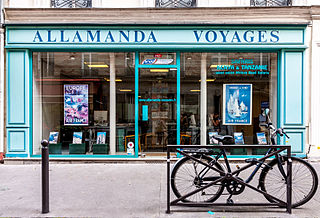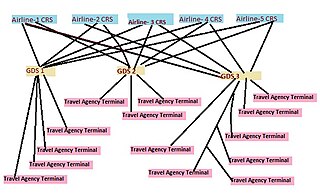Related Research Articles
British Caledonian (BCal) was a British private independent airline which operated out of Gatwick Airport in south-east England during the 1970s and 1980s. It was created as an alternative to the British government-controlled corporation airlines and was described as the "Second Force" in the 1969 Edwards report. It was formed by the UK's second-largest, independent charter airline Caledonian Airways taking over British United Airways (BUA), then the largest British independent airline and the United Kingdom's leading independent scheduled carrier. The carrier slogan was Let's go British Caledonian in the 1970s and We never forget you have a choice in the 1980s. The BUA takeover enabled Caledonian to realise its long-held ambition to transform itself into a scheduled airline. The merged entity eventually became the UK's foremost independent, international scheduled airline.

Caledonian Airways was a wholly private, independent British charter airline formed in April 1961. It began with a single 104-seat Douglas DC-7C leased from the Belgian flag carrier Sabena. Caledonian grew rapidly over the coming years to become the leading transatlantic "affinity group" charter operator by the end of the decade. During that period, passenger numbers grew from just 8,000 in 1961 to 800,000 in 1970. The latter represented 22.7% of all British non-scheduled passengers. It also became Britain's most consistently profitable and financially most secure independent airline of its era, never failing to make a profit in all its ten years of existence. By the end of 1970, Caledonian operated an all-jet fleet consisting of eleven aircraft and provided employment for over 1,000 workers. At that time, its principal activities included group charters between North America, Europe and the Far East using Boeing 707s, and general charter and inclusive tour (IT) activities in Europe utilising One-Elevens.

A travel agency is a private retailer or public service that provides travel and tourism-related services to the general public on behalf of accommodation or travel suppliers to offer different kinds of travelling packages for each destination. Travel agencies can provide outdoor recreation, arranging logistics for luggage and medical items delivery for travellers upon request, public transport timetables, car rentals, and bureau de change services. Travel agencies can also serve as general sales agents for airlines that do not have offices in a specific region. A travel agency's main function is to act as an agent, selling travel products and services on behalf of a supplier. They are also called Travel Advisors. They do not keep inventory in-hand unless they have pre-booked hotel rooms or cabins on a cruise ship for a group travel event such as a wedding, honeymoon, or other group event.
Worldspan is a provider of travel technology and content and a part of the Travelport GDS business. It offers worldwide electronic distribution of travel information, Internet products and connectivity, and e-commerce capabilities for travel agencies, travel service providers and corporations. Its primary system is commonly known as a Global Distribution System (GDS), which is used by travel agents and travel related websites to book airline tickets, hotel rooms, rental cars, tour packages and associated products. Worldspan also hosts IT services and product solutions for major airlines.
CityFlyer Express was a short-haul regional airline with its head office in the Iain Stewart Centre next to London Gatwick Airport in England.
Computer reservation systems, or central reservation systems (CRS), are computerized systems used to store and retrieve information and conduct transactions related to air travel, hotels, car rental, or other activities. Originally designed and operated by airlines, CRSs were later extended for use by travel agencies, and global distribution systems (GDSs) to book and sell tickets for multiple airlines. Most airlines have outsourced their CRSs to GDS companies, which also enable consumer access through Internet gateways. Modern GDSs typically also allow users to book hotel rooms, rental cars, airline tickets as well as other activities and tours. They also provide access to railway reservations and bus reservations in some markets, although these are not always integrated with the main system. These are also used to relay computerized information for users in the hotel industry, making reservation and ensuring that the hotel is not overbooked.
Sabre Global Distribution System, owned by Sabre Corporation, is a travel reservation system used by travel agents and companies to search, price, book, and ticket travel services provided by airlines, hotels, car rental companies, rail providers and tour operators. Originally developed by American Airlines under CEO C.R. Smith with the assistance of IBM in 1960, the booking service became available for use by external travel agents in 1976 and became independent of the airline in March 2000.
A passenger name record (PNR) is a record in the database of a computer reservation system (CRS) that contains the itinerary for a passenger or a group of passengers travelling together. The concept of a PNR was first introduced by airlines that needed to exchange reservation information in case passengers required flights of multiple airlines to reach their destination ("interlining"). For this purpose, IATA and ATA have defined standards for interline messaging of PNR and other data through the "ATA/IATA Reservations Interline Message Procedures - Passenger" (AIRIMP). There is no general industry standard for the layout and content of a PNR. In practice, each CRS or hosting system has its own proprietary standards, although common industry needs, including the need to map PNR data easily to AIRIMP messages, has resulted in many general similarities in data content and format between all of the major systems.

SITA is a multinational information technology company providing IT and telecommunication services to the air transport industry. The company provides its services to around 400 members and 2,500 customers worldwide, which it claims is about 90% of the world's airline business. Around the world, nearly every passenger flight relies on SITA technology.

Amadeus IT Group, S.A. is a major Spanish IT provider for the global travel and tourism industry.

A global distribution system (GDS) is a computerised network system owned or operated by a company that enables transactions between travel industry service providers, mainly airlines, hotels, car rental companies, and travel agencies. The GDS mainly uses real-time inventory (e.g. number of hotel rooms available, number of flight seats available, or number of cars available) from the service providers. Travel agencies traditionally relied on GDS for services, products and rates in order to provide travel-related services to the end consumers. Thus, a GDS can link services, rates and bookings consolidating products and services across all three travel sectors: i.e., airline reservations, hotel reservations, car rentals.
British Caledonian (BCal) came into being in November 1970 when the Scottish charter airline Caledonian Airways, at the time Britain's second-largest, wholly privately owned, independent airline, took over British United Airways (BUA), then the largest British independent airline as well as the United Kingdom's leading independent scheduled carrier.
The Emirates Group is a state-owned Dubai-based international aviation holding company headquartered in Garhoud, Dubai, United Arab Emirates, near Dubai International Airport. The Emirates Group comprises dnata, an aviation services company providing ground handling services at 126 airports, and Emirates Airline, the largest airline in the Middle East. Emirates Airlines flies to over 150 destinations across 6 continents, operating a fleet of over 250 wide-bodied aircraft. The airline has 170 aircraft on order worth US$58 billion. The Emirates Group has a turnover of approximately US$28.3 billion and employs over 105,000 employees across all its business units and associated firms, making it one of the biggest employers in the Middle East. The company is wholly owned by the Government of Dubai directly under the Investment Corporation of Dubai and as part of Dubai Inc.
Interlining, also known as interline ticketing and interline booking, is a voluntary commercial agreement between individual airlines to handle passengers traveling on itineraries that require multiple flights on multiple airlines. Such agreements allow passengers to change from one flight on one airline to another flight on another airline without having to gather their bags or check-in again. Airlines can also promise free rebooking if the connection is lost due to a delay.
Airline reservation systems (ARS) are systems that allow an airline to sell their inventory (seats). It contains information on schedules and fares and contains a database of reservations and of tickets issued. ARSs are part of passenger service systems (PSS), which are applications supporting the direct contact with the passenger.
Videcom International Limited is a United Kingdom travel technology company based in Henley-on-Thames. It designs, develops and provides modern computer reservations systems to airlines and the travel industry, specializing in the hosting and distribution of airline sales.
Alternate air ticket purchasing order systems allow for alternative ways of purchasing air tickets and GDS Connectivity not involving Internet or personal TA contact.
Amadeus is a computer reservation system owned by the Amadeus IT Group with headquarters in Madrid, Spain. The central database is located at Erding, Germany. The major development centres are located in Sophia Antipolis (France), Bangalore (India), London (UK), and Boston. In addition to airlines, the CRS is also used to book train travel, cruises, car rental, ferry reservations, and hotel rooms. Amadeus also provides New Generation departure control systems to airlines. Amadeus IT Group is a transaction processor for the global travel and tourism industry. The company is structured around two key related areas—its global distribution system and its "IT Solutions" business area.
Galileo is a computer reservations system (CRS) owned by Travelport. As of 2000, it had a 26.4% share of worldwide CRS airline bookings.
Royal Brunei Airlines is the national air carrier of Brunei Darussalam. In addition to the aircraft business, it also has a number of subsidiaries.